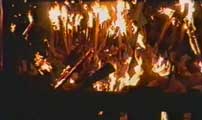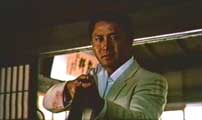|
|
|
|
|

|
 |
| The Decisive Moment: |
 |
|
As the time for the decision to sell his property
draws near, Tatsuo finds himself in the mountains in a sudden rainstorm.
His fellow loggers run for cover, but he remains in the rain, and
in the anguish of indecision, beats his hands against a giant tree.
Then he starts down toward the river, but a falling tree blocks
his path. He changes direction saying out loud, “I understand.”
He has come to a fateful decision, though we do not know what it
is. He takes a different path to the river and drinks from it like
an animal, on all fours. Then he bathes in a nearby waterfall.
|
 |
 |
 |
|
Click on image to view
video
|
| video 3
Tatsuo in the rainstorm.
|
|
 |
|
|
|
 |
 |
 |
| The Fire Festival: |
 |
|
The day of the festival arrives. Tatsuo’s two
young sons have a fever so he represents them by taking three torch
sticks to the ceremony. The festival is sometimes a coming-of-age
ritual for young men. The torches of the participants will be lit
from a single torch brought into the Shrine precincts by a runner.
But first, another villager, clowning around, lights his torch and
tries to light Tatsuo’s.
Tatsuo flies into a sudden rage, attacking the
man physically, accusing him of bringing a “false fire.”
Then the real fire arrives, the torches are lit, and the men stream
down the mountain, their torches forming a “waterfall”
of fire.
|
 |
 |
 |
|
Click on image to view
video
|
| video 4
The Fire Festival: cascade of light
down the mountain.
|
|
 |
|
|
 |
| The next morning, Tatsuo is formally dressed and
calm, looking out from his home to the inlet. He is wearing a white
suit, the color of the clothes worn by the festival participants.
A family meeting is about to occur. The two boys are returning home
from school with their young teacher. Tatsuo’s calm makes all
the more shocking what happens next. He goes inside, deliberately
loads his shotgun and systematically kills all the other adults in
the house. The boys, failing to comprehend, treat it as a game and
hide in the closet. The teacher, a Greek chorus of one, doomed to
confront something beyond comprehension, falls to her knees and then
on all fours. Tatsuo finds the boys and kills them. He arranges their
bodies carefully beside the adults and smears their blood on his chest
and forearms as he had done earlier with some birds trapped in the
mountains. Then he shoots himself. |
 |
 |
 |
|
Click on image to view
video
|
| video 5
The sacrifice.
|
|
 |
|
|
|
 |
 |
  |
Bataille and Ritual Sacrifice: |
  |

|
| Ritual sacrifice, either real or
symbolic, is a ubiquitous feature of ritual traditions across times and
cultures. Surprisingly, few serious accounts of the underlying meaning of
sacrifice have been advanced. We will rely on Georges Bataille’s theory.
His starting point is an investigation of our evolution from animals to
persons. His is an a priori, conceptual account of certain fundamental
changes in consciousness that must have occurred in order for human life
to have emerged. These changes can be traced speculatively in the advent
of the manufacture of stone tools, for example. Even at that nascent level,
we can see what is required. To make—and then amend—tools requires
“the postulation of the object as such;” and that entails
the recognition that the tool is a form of the non-I separate from the
maker, and that it exists in duration. Furthermore, since
the tool is typically modified in order to better serve our purpose, we
come to conceive of ourselves as transcending the tool, and this introduces
considerations of utility, the distinction between means and ends, and between
subjects (the person) and objects (the stone tool). In short, we come to
live in a world of separate things enduring through time, a discontinuous
world mediated by tools and ultimately by language. This opens up the possibility
of turning subjects (other living creatures) into objects (things). We bend
the world to our purposes even to the point of transforming persons and
animals into things by subjugating or enslaving them. Of course the gains
are great: we become people of project, inhabiting a world of things
that can be molded to our ends. Bataille sees no possibility of retreat
from this condition; it characterizes who we are as human beings—people
of project in a world of things. |

|
 |
The World Prior to Project: |
 |
 |
| If this is the situation into which
we emerged, what did we emerge from? Bataille arrives at a description of
our former state by negating the concepts just discussed. Our prior state
was a state of animality; poetically speaking “animals are in the world
as water in water.” That is, the prior state is one of immanence rather
than transcendence; it is unbounded, not circumscribed conceptually; it
can exhibit violence rather than controlled stability, casual and abrupt
destruction, in place of production of the useful which requires delayed
gratification. It is also immediate, existing in the present rather
than in duration, and unmediated by either tools or language. Bataille
sometimes refers to this state of things as the immanent immensity.
This too is what we are; we are of the immanent immensity
and we have a foot in both camps: the unbounded world of intimate immediacy
and the stabilized, individuated world of things. In that sense we are
paradoxical creatures, and are a mystery to ourselves.8 We will see that
ritual sacrifice mirrors and responds to this paradox.
It is not easy to conceive of the immanent immensity,
of course, since it is “outside” conceptual divisions, and it
seems to entail at least a momentary dissolution of the self. Bataille
resorts to metaphorical description. First, he pictures us caught up “in
the vast flow of things” like one wave among many (“water in
water”), and urges us to become “precisely aware of this anguishing
position.”9 In contrast, if we continue to see ourselves
only as things among other things in the comparatively stable world of
project, then, he says, we “have been deprived of the marvelous.”
He goes on: “The glories, the marvels of your life are due to this
resurgence of the wave which was tied in you to the immense sound of the
cataract of the sky.”10 Finally, he says, “What is
intimate in the strong sense [i.e., the immanent immensity] is what has
the passion of an absence of individuality, the imperceptible sonority
of a river, the empty limpidity of the sky: [even so] this is still a
negative definition from which the essential is missing.”11
Tatsuo experiences the world this way from time to time, and it’s
the affection images that express this experience.
|
| |
|
| 8Bataille, Theory of Religion:
p. 42: “In the degree that he is the immanent immensity, that
he is being, that he is of the world, man is a stranger to himself.” |
 |
| 9 Bataille. Inner
Experience, p. 95. |
 |
| 10Ibid., p. 95. |
 |
| 11Bataille, Theory of Religion,
pp. 50-1. |
|
|
| |
|
|
| |
Next Page Previous
Page About
the Authors |
|
| |
|
|






